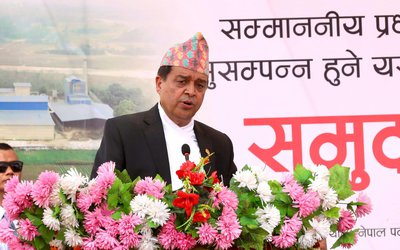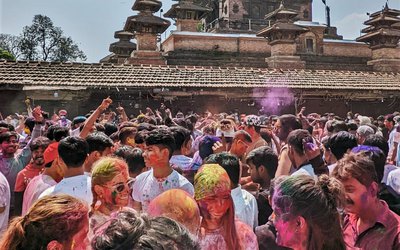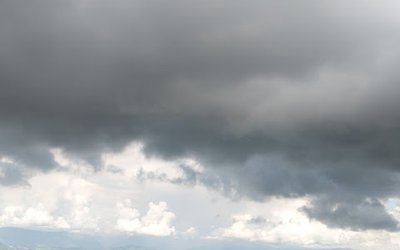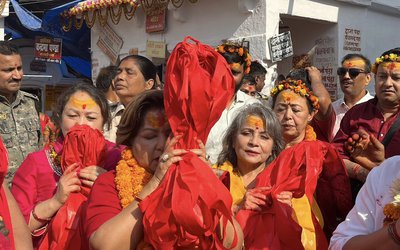
Prime Minister Sher Bahadur Deuba has refused to heed suggestions that he postpone a five-day official trip to Delhi beginning August 23, in view of the floods. At least 150 people have died in the floods and a large area, especially in the Tarai, which is the granary of the country, is under water. Parliament has asked Deuba to tell India that its unilateral construction of about 15 embankments — some of them less than 12 km away from the border — has caused the devastation. The House sentiment is that India must be held accountable for the destruction.
Deuba had earlier told leaders of various parties that he would firmly ask India to honour its commitment and execute past agreements, including finalizing the Detailed Project Report (DPR) of the 6,000 MW Pancheshwar hydropower project that was signed some 20 years ago. Deuba, incidentally, was the PM then and had taken the initiative on the project. India’s External Affairs Minister Sushma Swaraj apparently assured Deuba during her recent visit that India was keen to finalize the DPR soon. But the political parties that were together when the agreement was signed do not see eye to eye on many issues now. It may not be easy to get them agree on the DPR. Politically and strategically China and Nepal do not concede any more that India has the “first right” over Nepal’s water resources. And, Nepal considers it has “special relations” with both its neighbours, not just India.
Deuba’s Delhi visit takes place in the background of the Doklam standoff. China wants Nepal to have a neutral stance on the matter. Beijing has also unleashed propaganda, which claims to expose Indian activities that undermine Nepal’s sovereignty. The Delhi visit will be a real test in diplomacy for Deuba. China was furious with him after he shared the stage with the prime minister of the Tibetan Government in Exile at an India Foundation seminar in Goa last year. This time Deuba is visiting India as prime minister and at a time when relations between India and China are at a low. He, surely, will be under watch.
China’s vice premier, Wang Yang, who visited Nepal shortly after Swaraj, expressed the hope that China and Nepal can work together. During his meetings, he was candid and expressed concern about the “political instability” in Nepal, which may have some impact on Chinese projects and Beijing’s expanding strategic interest.
Interestingly, Wang Yang had a one-on-one with K.P. Oli, former prime minister and chairman of the Communist Party of Nepal-United Marxist Leninist. Wang’s closed-door meeting with Oli, who is perceived to be pro-Chinese by the Indian establishment, is seen as a brazen diplomatic response to Swaraj heaping praise on Deuba and CPN- Maoist Centre leader Pushpa Kamal Dahal. Their alliance, she had said, contributed a lot to building democracy in Nepal.
During the 11 years when it supported the radical political agenda in Nepal, India gradually lost the trust and respect of the many actors it worked with, starting with King Gyanendra and supporters of the traditional political forces and lately, the Madhesi leaders. The post-earthquake economic blockade also saw the non-Maoist left groups, including the CPN-UML, distancing from India. That India has had to pin its hope on Deuba and Dahal, both heading weak and divided parties, reveals much about the influence India currently wields in Nepal.
In contrast, the clever propaganda of China, carried out through multiple channels, points at all that it has avoided doing in Nepal. This way it highlights what India does in Nepal. Sure, China does not encourage or support “anti-state activities or insurgency or regime changes”, but there is a clear message directed somewhere else. Recently, Beijing sponsored the trip of a delegation of the “Greater Nepal Group” that occasionally raises claim over vast territory including Uttarakhand that Nepal lost to the British East India Company during 1814-15 war.
Deuba has also been asked by politicians and diplomats to raise the issue of Lipulekh on the Nepal-China-India tri-junction, which China and India had jointly agreed to develop as a bilateral trade route two years ago, when he is in New Delhi.
Swaraj apparently has asked Deuba to prepare a “wish list” as well as suggest one “mega project to be gifted by India”. Past record, the prevailing trust deficit between the two countries and Nepal’s divided politics, however, are likely to hold him back. But Deuba will be doing a great service if he takes up the issues flagged by the Nepali actors with India. Nepal-India ties are better served if these grievances are addressed and not pushed under the carpet.
Courtesy: Indian Express

Yubaraj Ghimire
Ghimire is a Kathmandu based journalist.
- Manmohan Singh And The Churn In Nepal
- Jan 08, 2025
- Why ‘Revolutionary’ Communist PM Prachanda Went To Temples In India
- Jun 08, 2023
- Why China Is Happy With Nepal’s New PM
- Jan 03, 2023
- Prachanda Sworn In As PM: New Tie-ups In Nepal, Concern In India
- Dec 27, 2022
- Young TV Anchor As Its Face, RSP Rise Takes Nepal By Surprise
- Nov 23, 2022














